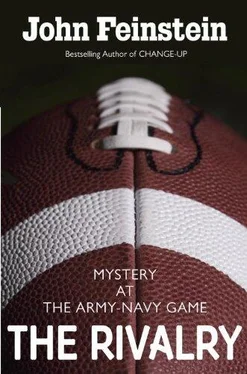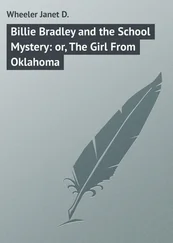“What’s this?” he asked.
“Just watch,” Kelleher said.
The Army players lined up in neat rows, facing the corps of cadets. The Tech players stood directly behind them.
“Ladies and gentlemen, please rise for the playing of the Army alma mater,” the public address announcer said.
Stevie noticed the Army players come to attention, as did the entire corps. After the song everyone yelled, “Beat Navy!”
Kelleher explained. “Army, Navy, and Air Force all play their alma maters after each game. When they play each other, the losing team goes first, then they cross the field and do it for the winning team. You see guys who have been trying to kill one another for three hours crying on each other’s shoulders.
“Paul Johnson was at Navy, so he understands the tradition. That’s why his guys stayed. It doesn’t always happen that way.”
“Cool,” Stevie said.
Hall was right behind them. “Come on, hustle up,” he said. “You don’t want to miss the song.”
“The song?” Stevie said. “They just played the song.”
Hall shook his head. “That was the alma mater. After we win, the players sing the song. You really need to hear it.”
Hall wasn’t kidding. As soon as the players had piled into the locker room, still hugging one another joyously, Ellerson jumped on a chair and called for silence, which he got very quickly.
“I don’t need to tell you what a great win that was,” he said. “I’m not sure there’s a game in which you earned the right to sing the song more than this one. So, let’s do it!”
With that, the entire team began singing the Army fight song, belting it out in a way that even Stevie recognized was way off-key, but it didn’t matter. Stevie had been in winning locker rooms after the World Series, the Super Bowl, and the Final Four. And he’d never seen a group of athletes happier than the Army players.
He and Kelleher lingered for a while. Hall introduced them to Ellerson just before the coach left for his postgame press conference.
“That was a great call on the last play,” Stevie said as they shook hands.
Ellerson waved him off. “Against that offense they can tell you what they’re going to do and it’s still hard to stop,” he said. “The kids just made a great play.”
Stevie liked him right away. So many coaches loved taking bows after wins. Clearly, Ellerson wasn’t like that.
Hall also took Stevie around the room so he could meet some of the players, explaining to them that Stevie was going to be around a fair bit in the next couple of weeks prior to the Navy game.
“I know who you are,” Mario Hill said. “I read all about you and your partner, Susan Carol, right? In my newspaper back home.”
“Where are you from?” Stevie asked, then felt embarrassed because he could easily have checked it in the media guide.
“Goldsboro, North Carolina,” Hill said.
Stevie nodded. Susan Carol’s hometown.
“I hope I get to meet Susan Carol too,” Hill said. “You two are quite a team.”
* * *
They were on their way back up to the press box so Kelleher could write his column for the Sunday paper when Stevie heard from the other half of the team.
He checked his phone and discovered a text from Susan Carol: Halftime. Great game. FREEZING to death. Miss you .
When they reached the press box, Stevie found a TV that was showing the end of the Navy-Notre Dame game. Just looking at the snow and the bundled-up fans in the stands made him feel cold.
Watching your game now , he texted Susan Carol back. Army’s win amazing . He paused for a second and then added: Miss you too. Not the same . They really were a good team.
Stevie heard a roar from the TV after Navy intercepted a pass only to have the officials give the ball back to Notre Dame because of a holding call.
“I don’t see it,” NBC analyst Pat Haden said. “If there was a hold, the official must have had an angle we don’t have.”
“It’s that kind of call along with the hold that denied Navy a touchdown earlier that makes people occasionally wonder if the Irish don’t get the benefit of the doubt from the officials in this stadium,” Tom Hammond added.
Stevie was surprised to hear Haden and Hammond say that. He had watched enough Notre Dame games to know that Hammond and Haden almost always sang the praises of the Irish. It had to have been a truly awful call if they were criticizing the officials, even mildly.
Kelleher walked up behind him, computer slung over his shoulder, as the game was winding down.
“Irish are going to pull it out here, huh?” he said as Notre Dame was lining up for a field goal to win the game.
When Stevie told him about the holding call, Kelleher shook his head. “I wish I was surprised.”
The field goal split the uprights and the Notre Dame players celebrated. Stevie looked for Susan Carol on the sidelines but didn’t see her.
He heard her loud and clear, though, when she called later to tell him about the game. Once she’d had a chance to review parts of the game on TV and see it from all angles, she’d only gotten madder than she’d been on the field.
“Let ’em have it,” Stevie told her.
And in her story for Monday’s Post labeled “News Analysis,” she did.
There are some who say the luck of the Irish has very little to do with luck, especially in Notre Dame Stadium. That was never more evident than Saturday, when two controversial holding calls from the officials were the difference between a Notre Dame win and a Navy win.
In the fourth quarter, with the game tied at 14 all, quarterback Ricky Dobbs lofted a perfect touchdown pass to G. G. Greene. But the play was called back on an offensive holding call. Navy’s coach, Ken Niumatalolo, was enraged by the call. But holding is not a reviewable play, so he was left to vent his frustration at referee Mike Daniels, saying, “You’re stealing the game from my players!” Daniels tacked on a charge of unsportsmanlike conduct for the Navy bench.
On the very next play, Notre Dame was able to capitalize on this second chance-picking up a fumbled pitch and running it back for a touchdown to put them ahead.
Navy battled back against a tired Notre Dame defense and put together a fifteen-play drive to tie the game again with just under six minutes left.
Notre Dame seemed poised to answer back when Navy cornerback Kevin Edwards jumped the route and intercepted a Roger Valdiserri pass, returning it to the Notre Dame 21. But again, a holding call reversed a Navy big play and gave the ball back to Notre Dame, along with a first down.
With only three seconds on the clock, Notre Dame was able to kick a field goal and win the game 24-21.
NBA Hall of Famer and Navy grad David Robinson was on the sidelines making his opinions known, wondering aloud if it was in the officiating contract that Notre Dame had to win at home.
NBC analysts with multiple replay angles could find no evidence of holding in either instance, prompting Tom Hammond to comment, “It’s that kind of call… that makes people occasionally wonder if the Irish don’t get the benefit of the doubt from the officials in this stadium.”
When a reporter visited the officials’ locker room after the game, referee Mike Daniels was belligerent. “We have no obligation to talk to the media,” Daniels said. “We all get pretty sick and tired of people blaming us for everything that goes wrong. Go find another scapegoat.”
While it’s true that officials are often cast as the villains and rarely the heroes of a game, the pattern of controversial calls in Notre Dame Stadium has many asking for further inquiry. Bad calls will always be a part of the game-officials are only human. But when a game is decided by the officials and not the players, the coaches and players deserve a thorough review and a thoughtful response. There have been longstanding questions about how officiating is run in college football, and games like this only add fuel to the fire of suspicion that referees have an incentive to slant calls in favor of the conference that pays their salaries-or, in this case, the team with its own TV network.
Читать дальше












